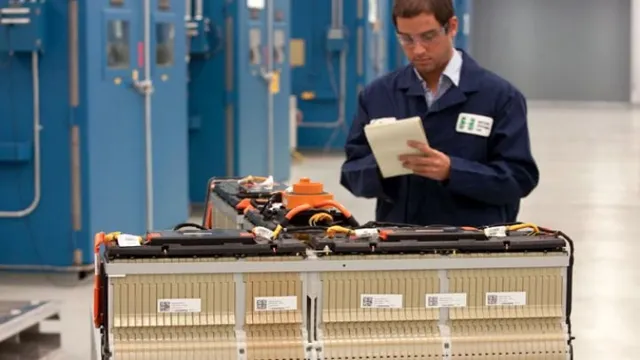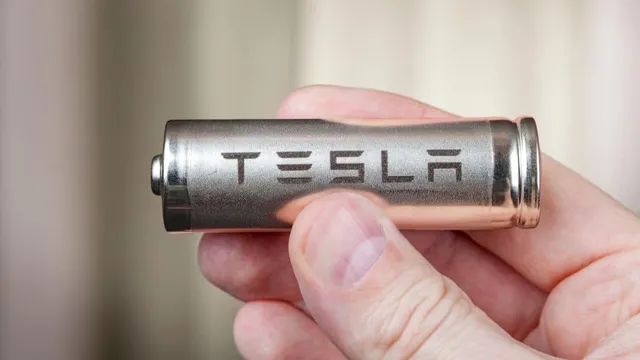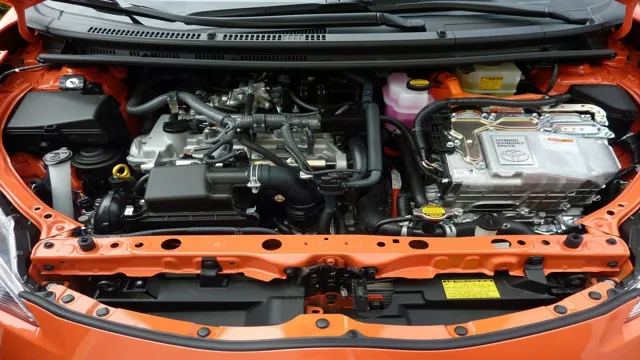Unlocking the Cost-Saving Secrets of Electric Car Battery Prices in the UK
Are you considering purchasing an electric car in the UK but worried about the battery prices? You’re not alone. The cost of electric car batteries has always been a major concern for potential buyers, but the good news is that prices have significantly come down in the UK in recent years, making electric cars more affordable than ever before. With advancements in technology and increased demand for electric vehicles, prices have fallen by almost 90% over the past decade.
As a result, electric vehicles have become more accessible to the masses, and with the added benefit of lower running costs, they are quickly becoming the preferred choice for commuters and environmentally conscious citizens alike. Of course, electric car battery prices are still higher than traditional petrol and diesel cars. However, when you factor in the savings on fuel costs, maintenance, and government incentives, the overall cost of owning an electric vehicle can be comparable or even cheaper than owning a traditional car.
In the UK, there is a range of electric vehicles available at varying price points, depending on your budget and requirements. From the budget-friendly Renault Zoe to the luxurious Tesla Model S, there’s an option for everyone. Plus, with continued development and competition in the market, we can expect to see even more affordable and efficient electric cars on our roads in the coming years.
All in all, while electric car battery prices may have been a concern in the past, it’s now more affordable than ever to make the switch to an electric vehicle. With lower running costs, lower emissions, and a range of options available, the practical and environmental benefits are impossible to ignore.
Overview of Average Prices
If you’re looking to purchase an electric car in the UK, one major factor you will need to consider is the price of the battery. The cost of electric car batteries can vary widely depending on the make and model of the vehicle, as well as the size and capacity of the battery. On average, electric car battery prices in the UK can fall anywhere between £2,500 and £8,000.
However, it’s worth noting that some premium electric cars may have batteries that cost more than £10,000. While this may seem like a significant expense, it’s important to consider the long-term savings of an electric car, such as reduced fuel costs and lower maintenance expenses. Additionally, some manufacturers offer warranties and incentives that can help offset the cost of the battery.
Ultimately, the price of an electric car battery in the UK will depend on a few different factors, but it’s important to do your research to find the option that best suits your needs and budget.
Comparing Cost by Brand and Model
When it comes to buying a car, one of the most important factors to consider is the cost. The price of a car can vary greatly depending on the brand and model, and it can be difficult to know where to start when it comes to comparing prices. On average, the cost of cars across all brands and models is around $36,000.
However, this can vary widely depending on the specific car you are looking at. For example, luxury brands such as BMW and Mercedes can have a much higher average cost of around $60,000, while more budget-friendly brands such as Kia and Hyundai have an average cost of around $22,000. It’s important to consider not only the upfront cost of a car but also the long-term costs such as insurance, maintenance, and fuel economy.
By doing your research and taking the time to compare prices, you can find a car that fits both your budget and your needs.

Factors Influencing Battery Cost
Battery cost is influenced by several factors, including the type of battery, its purpose, and its size. Lead-acid batteries are the most inexpensive option, with an average price of around $150 to $200, while lithium-ion batteries are more expensive, with an average price of $500 to $1,000. The purpose of the battery also plays a role, with deep cycle batteries commonly used for marine and RV applications costing more than starting batteries for cars and trucks.
Additionally, the size of the battery plays a role in determining the cost, with larger batteries typically costing more than smaller ones. It’s important to consider these factors when selecting a battery, as choosing the right one can save you money in the long run.
Long-Term Savings and ROI
When it comes to electric car battery prices in the UK, the initial investment may seem daunting. However, it’s important to consider the long-term savings and return on investment. Electric cars have lower operating costs than traditional gas-powered vehicles, and with battery technology advancements, their efficiency is only increasing.
By investing in an electric car with a high-quality battery, you can save money on fuel and maintenance in the long run. Plus, with government incentives and grants, the cost of purchasing an electric car can be reduced. Taking into account the overall cost of ownership, electric cars have a higher return on investment than their gas-powered counterparts.
So, yes, electric car battery prices may be higher upfront, but they offer significant savings over time.
Calculating Charging Costs and Efficiency
As electric vehicles continue to gain in popularity, many people are considering the long-term savings of making the switch from gas-powered cars. One significant factor to consider is the cost of charging versus the cost of filling up at the gas station. Fortunately, calculating charging costs is relatively easy.
One way to calculate the cost is to take the price per kilowatt-hour and multiply it by the number of kilowatt-hours needed to fully charge your car. For example, if you pay $0.10 per kilowatt-hour and your car needs 50 kilowatt-hours to fully charge, the cost would be $
Another essential factor to consider is the efficiency of your electric vehicle and charging station. The more efficient your car and charger are, the less money you will spend over the long-term. Investing in a high-quality charging station that is ENERGY STAR-certified is an excellent way to maximize efficiency and save money on charging costs.
By considering both charging costs and efficiency, you can make an informed decision about the long-term savings and ROI of owning an electric vehicle.
Tax Credits and Other Incentives
When it comes to investing in renewable energy, tax credits and other incentives can help provide long-term savings and a strong ROI. These incentives can come in many forms, such as federal tax credits for solar installations, rebates for energy-efficient appliances, and grants for renewable energy projects. By taking advantage of these programs, individuals and businesses can significantly lower the up-front costs of transitioning to renewable energy sources.
In addition to reducing costs, these incentives can also help increase the overall value and efficiency of a property, further contributing to long-term savings and ROI. So, not only does investing in renewable energy help reduce our carbon footprint, but it can also provide financial benefits that make it a sound investment for the future.
Maintenance and Replacement Costs
Long-term savings When considering the purchase or installation of a new technology system, it’s important to think about the long-term savings and return on investment (ROI) that can be achieved. While the initial cost may seem high, the maintenance and replacement costs over time can add up exponentially. By investing in a quality system that is built to last, you can save money in the long run and achieve a positive ROI.
Additionally, consider the cost savings that come from increased efficiency and productivity. A more efficient system can streamline tasks and reduce the need for manual labor, ultimately resulting in cost savings. So, while it may be tempting to go for the cheapest option upfront, investing in a quality system with a higher initial cost can ultimately lead to greater cost savings and ROI in the long-term.
Future Trends and Forecasts
Electric car battery prices in the UK are expected to continue to decrease in the coming years as the demand for electric vehicles increases and technology advances. According to BloombergNEF, the cost of electric vehicle batteries has decreased by 87% since 2010, and further cost reductions are expected, making electric cars more affordable for consumers. This decrease in cost is largely due to innovations in battery technology and economies of scale in production.
Additionally, the UK government’s commitment to achieving net-zero carbon emissions by 2050 has propelled the growth of the electric vehicle market by offering incentives for the purchase of electric vehicles and expanding the country’s charging infrastructure. As more and more people begin to switch to electric cars and the market becomes more competitive, it is likely that the cost of batteries will continue to decrease, making electric vehicles an even more cost-effective and environmentally friendly option for drivers in the UK.
Expected Price Decreases Over Time
When it comes to technology, we all know that prices tend to decrease over time. This is because there are always newer and better models being released, which makes older versions less valuable. Additionally, as production methods improve and components become cheaper, manufacturers are able to offer their products at lower prices.
This is especially true for smartphones, which are one of the most-used and rapidly-evolving pieces of technology out there. The expected price decreases for smartphones over the coming years are quite staggering, with some predictions stating that prices could drop by as much as 50% in the next decade. This is great news for consumers, who will be able to enjoy cutting-edge technology without breaking the bank.
So, if you’re in the market for a new phone, it might be worth waiting a little while longer for those prices to drop!
Industry Developments and Advances
As technology progresses, the future of the industry is being shaped by numerous innovative developments and exciting advances in fields such as artificial intelligence, automation, blockchain, and the Internet of Things. One of the upcoming trends in the industry is the growing adoption of predictive analytics, which enables companies to use data to anticipate future events and make better decisions. Additionally, the rise of decentralized technologies such as blockchain is opening up new possibilities for collaboration and transparency in various industries.
Another key development is the increasing emphasis on sustainability, with many companies realizing the importance of reducing their carbon footprint and implementing eco-friendly practices. As a result, renewable energy and circular supply chains are predicted to become increasingly popular in the coming years, paving the way for a more sustainable future. These trends and forecasts represent an exciting time for the industry, offering immense potential for growth, innovation, and progress towards a brighter tomorrow.
Conclusion and Recommendations
In conclusion, the ever-decreasing cost of electric car batteries in the UK has sparked a new era of eco-friendly driving. Not only do electric cars offer a sustainable solution to our transportation needs, but with prices now falling to more affordable levels, they have also become a practical option for consumers. So, whether you’re a tree-hugger or just looking for a good deal, getting behind the wheel of an electric car may be the smartest (and coolest) decision you make this decade!”
FAQs
What is the average cost of an electric car battery in the UK?
The average cost of an electric car battery in the UK is around £5,000 to £8,000.
How long do electric car batteries last in the UK?
The lifespan of electric car batteries in the UK varies depending on the model and usage, but they typically last between 8-10 years.
Are there government incentives available for purchasing electric car batteries in the UK?
Yes, there are government incentives available such as the OLEV grant which offers up to £350 towards the cost of a home charging unit.
Can electric car batteries be recycled in the UK?
Yes, electric car batteries can be recycled in the UK and are often used for energy storage in homes or as backup power for electric vehicles.






